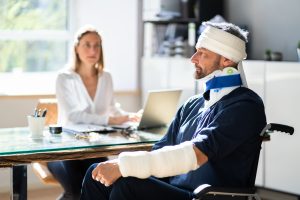
If you are ever seriously injured because of someone else’s negligence, you may want to consider suing them to recover damages. Thousands of personal injury lawsuits are filed every year over car accidents, unsafe properties, defective products, dog bites, and other unexpectedly harmful scenarios. New Jersey has the third highest rate of personal injury cases in the US at 218% over the national average.
The one bringing the lawsuit is called the plaintiff, and it is usually the plaintiff’s responsibility to prove the other party–the defendant–was negligent in a way that directly caused the plaintiff’s injuries. This is known as the burden of proof. The legal experts at The Law Office of Andrew S. Maze have compiled this guide to one of the most important things you, the plaintiff, can do to strengthen your personal injury case: properly documenting your injuries.
Why Document Your Injuries?
Collecting and preserving images and information about your or a loved one’s injuries after an accident is important for a few reasons. The more concrete proof you have to document your injuries, the seriousness of your injuries, and the accident being the direct cause of your injuries the stronger your position will be in a personal injury lawsuit. It also ensures you receive proper medical treatment, helps you secure the cooperation of insurers, and protects you if a criminal case emerges.
Strengthening Your Position in a Personal Injury Lawsuit
So how does properly documenting your injuries help you in a personal injury lawsuit? It helps in several ways.
- Establishes causation: documenting your injuries, including the date and time you were hurt and the details of the accident resulting in those injuries, establishes a chain of causation. It also creates a paper trail link between the accident and your injuries, which is important when presenting your case in a lawsuit. Considering you will have the burden of proof, you will need these documents, as well as any related medical documents, to show how the negligence of someone else directly caused your injuries and the resulting damages (medical bills, wage loss, and even psychological trauma).
- Proving damages: Personal injury cases hinge on proving the extent of the damages suffered by the plaintiff. Through thorough documentation of your injury through accurate records of medical reports, bills, treatments, medicines, and other medical expenses, you showcase the physical, financial, and emotional toll of your accident.
- Facilitating settlement negotiations: Most personal injury cases end up settling, which means you want a strong case to help you in negotiations. Proper documentation of the accident, your injury, and the damages the accident caused provide the basis for the compensation. A meticulously curated record of the situation makes it more difficult for the opposing party to undermine the legitimacy of your legal claims.
- Credibility: Properly documenting your accident and injury lends credibility to your case. Gaps or mistakes in documentation allow the opposing party in your personal injury lawsuit to cast doubt on your injury and the idea that it was caused by the defendant’s negligence. Meticulous record-keeping also demonstrates your commitment to transparency, which bolsters the credibility of your case.
- Strengthening litigation: If your personal injury lawsuit goes to trial, it is important to have thorough and accurate records to provide your legal team with the tools to build a compelling argument on your behalf. Your attorney will need a comprehensive and coherent account of your accident and its aftermath to highlight the negligence of the responsible party and the incident’s impact on your life.
Other Important Reasons To Document Your Injuries
- Accurate medical treatment: Creating and maintaining proper documentation of your injury is medically important because it will give your doctors information that will help them properly diagnose and treat your injury throughout your recovery.
- Insurance: Insurance providers require detailed documentation of injuries to process claims. You need proper documentation of your injury so that you can receive the compensation and assistance you need from the insurance company.
- Criminal cases: Personal injury lawsuits are civil cases. However, accidents can sometimes also lead to criminal cases. If your accident spawns a criminal case, either against you or the party that caused your injury, it is important to have proper documentation to protect your legal rights and interests.
What Kind of Documentation Do You Need?
Many different types of documentation can be useful in the aftermath of an injury. The exact documentation that you will need will depend on the nature of the accident. A workplace slip-and-fall may require different documentation than a car accident in your personal vehicle. Certain types of documentation will be useful in any personal injury lawsuit, while others may only be useful in more specific circumstances. However, the following list is a good overview of useful examples of injury documentation.
- A detailed written account of the accident
- Photos of the scene of the accident and of your injuries
- Contact information of witnesses
- Police reports
- Reports from private investigations
- Initial medical examination records
- Medical records and bills
- Prescriptions
- Therapy records
- Correspondence with insurance companies
- Workplace injury reports
- Workers’ compensation claims
- Insurance claims
Call The Law Office of Andrew S. Maze
If you are ever seriously injured, you will need to document your injuries but this is not the only essential action to take in the wake of your accident. You will also need an experienced and compassionate legal team to fight for your interests in and out of court. If you are ever injured, call The Law Office of Andrew S. Maze so that we can assist you in your time of need.